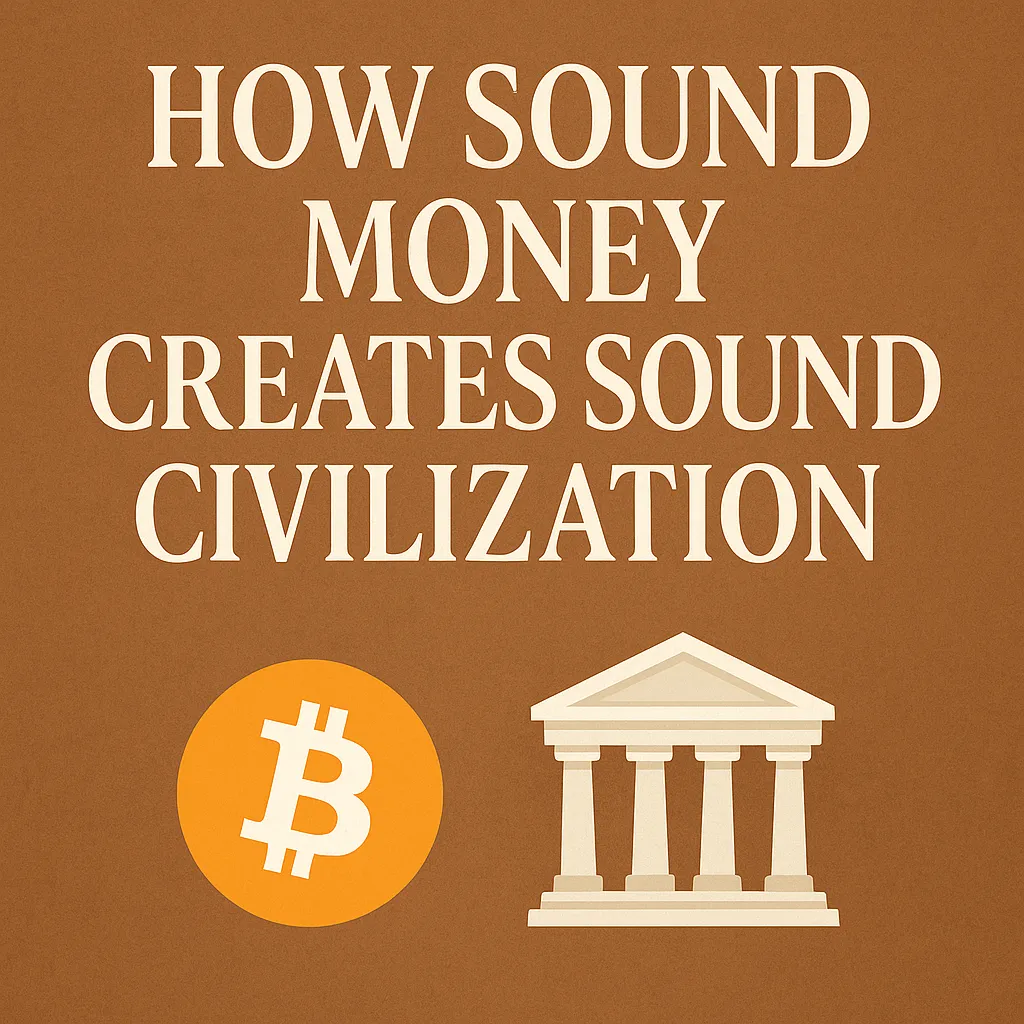
The Civilization-Scale Consequences of Broken Money
Money is more than a tool for transactions. It’s the foundation of civilization.
It affects how we think, how we plan, how we relate to others, and how we build our future. When money is sound, civilization flourishes. When money is broken, civilizations crumble—from Rome to Weimar to, potentially, us.
Fiat money—paper currencies untethered from anything real—has quietly eroded the foundations of our society. And the consequences go far beyond economics.
We’re not just witnessing inflation. We’re witnessing the collapse of long-term thinking, the corruption of institutions, and the decay of culture itself.
Let’s unpack how broken money breaks everything else.
1. High Time Preference: A Civilization's Silent Killer
Sound money encourages long-term thinking. It rewards saving, discipline, patience, and stewardship.
Fiat does the opposite.
When your money loses value every year, your incentive is to spend it as fast as possible. Save less. Consume more. Think short-term.
This is called high time preference—a shift in mindset that prioritizes immediate gratification over future planning.
And it shows up everywhere:
Shorter product cycles and planned obsolescence
Government deficits and political quick fixes
Environmental neglect in favor of quarterly profits
The collapse of trust in education, health, and media
The future gets sacrificed for the now. That’s what broken money does.
2. Easy Money = Corrupt Institutions
When governments can print money at will, they don't need to earn your trust. They don’t need to balance budgets, prioritize spending, or preserve value.
They just inflate.
This “easy money” removes the need for accountability—and institutions follow suit:
Banks grow reckless, knowing bailouts will come
Universities chase tuition dollars with low-value degrees
Corporations prioritize stock buybacks over innovation
Media chases clickbait to survive in a financialized economy
We’ve built a culture of short-term thinking and shallow incentives because our money system rewards neither truth nor excellence.
3. Fiat Fuels the Wealth Gap
Easy money doesn’t trickle down. It funnels up.
Newly printed currency enters the economy through banks and asset holders—those already closest to financial power. They get richer first, while wages lag behind and prices rise for everyone else.
This is called the Cantillon Effect, and it’s why:
The rich get richer
The middle class gets squeezed
The poor get priced out of homes, education, and opportunity
It’s not capitalism that’s broken. It’s the money.
4. Culture Becomes Hollow
A civilization that abandons long-term values soon forgets how to build lasting beauty.
Compare the cathedrals of the past—built over centuries—to today’s soulless concrete boxes. Why the change?
Because high time preference cultures can’t afford to think in generations.
Art becomes trendy. Literature becomes shallow. Education becomes political. Everything becomes short-term, disposable, and transactional.
Fiat doesn’t just debase money. It debases meaning.
5. Bitcoin Is a Cultural Reboot
Bitcoin’s fixed supply and transparent rules restore what fiat stole: time preference anchored in the future.
It doesn’t inflate.
It can’t be printed.
It rewards saving.
It favors patience.
It aligns incentives with truth, not narrative.
This is why Bitcoin is more than finance—it’s civilization software.
It helps reintroduce discipline, integrity, and long-term thinking at the base layer of society.
Conclusion: Fix the Money, Fix the Future
You can’t build a healthy world on broken money. You can’t expect honesty from institutions fueled by inflation. You can’t create lasting value in a system that punishes saving and rewards speculation.
Bitcoin doesn’t just solve economic problems—it lays the groundwork for a civilizational renaissance.
It reminds us that progress isn’t about faster everything. It’s about lasting everything.
Fix the money. Fix the time horizon. Fix the future.



